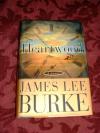(Billy Bob Holland) 1999
"Heartwood" finds attorney and former Texas Ranger Billy Bob Holland defending luckless ex-bullrider Wilbur Pickett, who has been accused of stealing from Earl Dietrich, the wealthiest man in Deaf Smith, Texas.
Billy Bob has his own history with Earl's wife, Peggy; they were briefly an item shortly after he graduated from high school, and he has carried a torch for her ever since.
Burke's work has been awarded an Edgar twice for Best Crime Novel of the Year. He has also been a recipient of a Breadloaf and Guggenheim Fellowship and an NEA grant. Two of his novels, Heaven's Prisoners and Two For Texas, have been made into motion pictures. His novel The Lost Get-Back Boogie was rejected 111 times over a period of nine years, and upon publication by Louisiana State University press was nominated for a Pulitzer Prize. |
A note of interest: James Lee is Alafair Burke's father. Must be in the genes (or should I say "jeans"?)
"Crusader's Cross"
In the summer of 1958, Dave Robicheaux and his half-brother Jimmie are just out of high school. Jimmie and Dave get work with an oil company, laying out rubber cables in the bays and mosquito-infested swamps all along the Louisiana-Texas coastline. They spend their off time at Galveston Island, fishing at night on the jetties, the future kept safely at bay, the past drifting off somewhere behind them. But on the Fourth of July, change approaches in the form of Ida Durbin, a sweet-faced young woman with a lovely voice and a mandolin. Jimmie falls instantly in love with her. But Ida's not free to love - she's a prostitute, in hock to a brutal man called Kale, who won't let her go. Thus, the plot thickens and Dave's search deepens.
"In the Moon of Red Ponies"
When last seen in Bitterroot,Texan attorney-turned-crime fighter Billy Bob Holland traveled to Montana to help a friend and ended up sending his nemesis Wyatt Dixon to prison for sixty years. At the opening of In the Moon of Red Ponies, Billy Bob and his family have since moved to the peaceful town of Missoula, Montana. However, Dixon is freed due to a breach of procedure, and once again Billy Bob finds himself and those he loves menaced by this remorseless killer. Soon Billy Bob is entangled in a complex battle that pits him not only against Wyatt Dixon, but against the very government he has sworn to support.
"The Tin Roof Blowdown"
This thriller weaves familiar images of the Katrina tragedy — refugees on rooftops, looters on boats — into a mystery that entertains even as it makes unsettling observations about the race and class tensions that exploded in the hurricane’s wake. The moral divisions here are as muddy as Mississippi floodwaters.
"Last Car to Elysian Fields"
For David Robicheaux, there is no easy passage home. New Orleans, and the memories of his life in the Big Easy will always haunt him. So to return there means visiting old ghosts, exposing old wounds, opening himself to new, yet familiar, dangers.
"Burning Angel"
When Sonny Boy Marsallus returns to New Iberia after fleeing for Central America to avoid the wrath of the powerful Giacana family, his old troubles soon follow. Meanwhile Dave Robicheaux becomes entangled in the affairs of the Fontenot family, descendants of sharecroppers whose matriarch helped raise Dave as a child. They are in danger of losing the land they've lived on for more than a century.
As Dave tries to discover who wants the land so badly, he finds himself in increasing peril from a lethal, rag tag alliance of local mobsters and a hired assassin with a shady past. And when a seemingly innocent woman is brutally murdered, all roads intersect, and Sonny Boy is in the middle.
With the usual James Lee Burke combination of brilliant action and unforgettable characters, "Burning Angel" is the author at his best - showing that old hatreds and new ones are not that far apart.
"Cadillac Jukebox" has a high body count, but the violence quotient is justified by the magnitude of the forces in conflict. The novel provides a theory of politics and power reminiscent of Robert Penn Warren’s portrayal of the same culture some years earlier in "All the King's Men" (1946). As in the Warren novel, the moral implications of power and greed are explored, as are the moral ambiguities in all relationships based on the existing imbalance of power.
"Cadillac Jukebox"
James Lee Burke’s ninth novel featuring Cajun detective Dave Robicheaux is haunting. In Burke’s series, the hard-driving suspense is balanced by lyric descriptions of Louisiana landscape; the characters who emerge from the brush and bayou are as appropriate to their place as are Thomas Hardy’s characters. The result is a mythic portrait of Louisiana with a cumulative richness that makes the series extremely addictive.
"Cadillac Jukebox" takes as its opening premise the arrest of a former Klan member, a violent, antisocial loner, for the twenty-eight-year-old murder of a civil rights leader. Aaron Crown claims innocence. Robicheaux’s sense of justice drags him unwillingly into the investigation, where he encounters a number of dangers on the way to the surprising truth—and as usual, some of the worst hazards are within himself.
 |
| Café Du Monde in New Orleans |
In this novel, the villains are not cardboard cutouts, and the heroes are not without flaw. Poetic justice does not reign supreme at the end. This novel provides the satisfaction of the detective story without demanding total suspension of disbelief.








